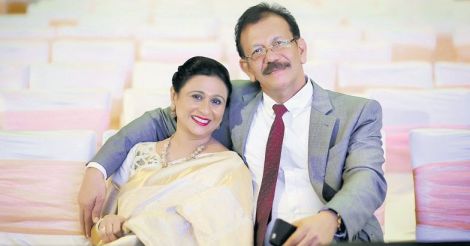Quitting Emirates did not sound like a bright idea back in 1997. The IT division head of the Dubai-based airline, however, had already set his sights on a lofty target. He wanted to transform the primitive management systems used by airline companies.
When V.K. Mathews returned to his home state of Kerala from the luxury of Dubai’s corporate life, airlines all over the world had barely taken off from the telegram-telex era of communication.
A Mumbai-London-New York aircraft would fly with half the seats vacant in anticipation of passengers boarding from London. In case there were no flyers from London, the aircraft would fly empty up to New York.
The company Mathews set up changed the way airlines managed their fleets. Airline firms including British Airways, Cathay Pacific, All Nippon Airways, Emirates, Etihad Airways, Qatar Airways and Jet Airways use the company’s software to manage everything from passenger reservation and flight coordination to aircraft maintenance and accounting.
The company provides solutions for the seamless functioning of the aviation industry that transports about 80 lakh people around the world any given day. The intricate and interconnected network of about a lakh aircraft that take to the skies every day is powered by a company based in Thiruvananthapuram.
Recommended: My encounter with the curse of God’s own country
IBS Software Services powers 10 of the premier 20 airlines and four of the big 5 oil companies. As many as 80 hotel chains and 30 travel companies run on the company’s business platform. It also helps regulate 70 percent of the goods transported in Japan and Australia.
Opportunity in challenge
Mathews’ soaring career reflects the transformation of the aviation industry over the last two decades. The man who became the youngest IT head of Emirates at the age of 39 reminisces on one of his greatest challenges.
“The meetings between airlines and the companies that made software for them were nothing less than full-blown battles. The software companies could not fulfill the demands of the airlines. That gap was my biggest opportunity. Why don’t I start a venture that can solve these problems?”
The decision was not easy though. Nobody had ever mulled leaving Emirates back then. Everything was taken care of, including the villa, car and the education of your children.
“I had almost reached the end of my career ladder. Only my boss was above me. Still, I decided to quit. You have to leave a company at the prime of your career, not in bad times. All you need is a clear reason to do so,” Mathews said.
Choosing his weapon
Mathews, the son of K.P. Korathu, the first manager of Federal Bank, was not desperate for a job when he completed his engineering degree. Like other boys his age, he was passionate about automobiles. He joined the Kanpur IIT to study aeronautical engineering.
He would have pursued a doctorate in the subject but for a bout of jaundice that denied him an opportunity to fly abroad. He was denied immigration clearance, a bureaucratic decision that would change the trajectory of aviation around the world.
He joined the Military College of Electronics and Mechanical Engineering in Secunderabad as a lecturer. The long-haired geek subjected himself to the rigors of military life for two years. Those were the times when the army had started focusing on information technology. A basic knowledge of computers was a prerequisite to climb up the ranks.
Mathews, however, was aghast when a majority of his students flunked in the exams. He gave them a second chance and all of them passed. He realized that teaching was not his cup of tea. He joined Air India.
Anyone with a knowledge of aeronautical engineering and computer engineering was precious commodity in airlines. Air India recruited 50 engineers in one go. After two years with the national carrier, Mathews joined Emirates, in 1983. He soon climbed up the ladder to become the first Asian to head the airline’s IT division.
Home beckons
Mathews was unconventional in more ways. He chose to set up his business in India, which did not have even five IT products to boast of. When he said he wanted to form a startup in Kerala, his well-wishers said he had lost his mind. But his wife Latha stood by his decision.
 VK Mathews with family
VK Mathews with family“We did not disclose our plan to many people. Most of them would have objected to it. We rented a house in Thiruvananthapuram. Power went off the first day itself. We had to make without electricity or water for two days. This would have scared off any entrepreneur. But my children got used to it.”
Mathews initially set up his company in Bangalore like everyone else at that time. He booked 4,000 square feet office space in Golden Enclave, where IT majors like Tata and Infosys had set shop.
He had to reconsider his options after he met one of his relatives, Thomas Zacharia, who had returned from the US for a stint as a visiting professor at IIT Madras. Zacharia told him about the nascent Technopark in Thiruvananthapuram. Mathews went to the location on the suburbs of the city and instantly fell in love with the space.
“It was a beautiful place with trees and lawns around. Software parks were concrete jungles everywhere else. But this seemed like a real park,” he said.
Technopark’s founder CEO, G Vijayaraghavan, boosted his confidence. Mathews booked 8,000 square feet of office space.
Show me the money
His next big challenge was to find the money for his venture. He raised Rs 1.75 crore all by himself. He still needed about Rs 2.5 crore to set up his business. Bank loans did not come easy for startups those days. The Kerala State Industrial Development Corporation (KSIDC) said it could not lend money unless the startup listed its working capital. The startup had only a few computers and creditors were looking for big machinery. The loan was rejected.
In a quirk of fate, Mathews was later appointed as a director of KSIDC.
As Mathews was presenting his case before KSIDC in-charge officer Amitabh Kanth, Canara Bank chief manager Prabha was also present in the cabin. After the failed negotiation, Prabha invited Mathews to the bank. She approved a loan in just three days. That got the startup off the ground.
He mortgaged all of his ancestral property for the loan. The company started operations with 55 employees. He did not compromise on quality. “The office was so well done that people asked me if I were building a 5-star hotel. I never doubted the success of my venture. I knew the aviation industry was waiting for the products I intended to make. IBS introduced the technology to phase out the 40-year-old existing technology,” he said.
Headwinds galore
The startup ran into rough weather in the fourth year. Major client-partner Swiss Air went into the red. This alone could have pulled down a service partner, but not IBS. Mathews struggled to pay his employees but the company clawed back eventually.
Then came the next setback. The company failed to deliver a product within the deadline, forcing it to pay a hefty compensation. The company ultimately survived the loss and, more importantly, the temporary crisis of credibility.
The initial hiccups notwithstanding, IBS rose to greater heights.
It has taken over six companies so far, including foreign ones. “We make many path-breaking software and systems sitting in this corner of the country. We replaced the 30-year-old system in British Airways. Another company had failed to do that twice. We replaced the entire cargo technical system in Lufthansa,” Mathews said.
Today IBS employs about 2,000 people in Technopark alone. The workforce consists of people from at least 25 countries. “Dedication to the company, passion for work, quality, honesty and mutual respect are ingrained in the company’s DNA,” said Mathews. He believes his life is a case study for new entrepreneurs.
“Who said you can’t do business here. I believe I owe my success to my location in Kerala. You have to be cent per cent committed and sincere to what you do. You can’t exploit people. If you go by these principles, you can make any business click in Kerala,” he said.
The man who helms a company which controls a major part of the air traffic around the world could be seen relishing his kappa and fish curry in his Jawahar Nagar residence. He has a word of advice for those non-resident Indians hesitant to return to India. “You can always play it safe by blaming the situation. But you become a real businessman if you can overcome those hurdles,” says he.
























 VK Mathews with wife Latha
VK Mathews with wife Latha